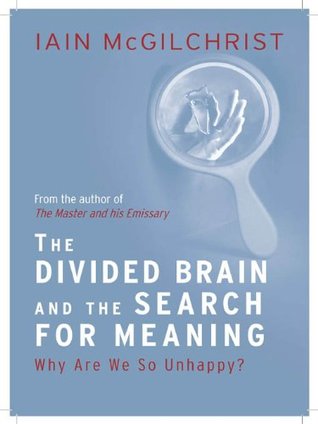More on this book
Community
Kindle Notes & Highlights
Read between
April 12 - April 19, 2020
Our increasing ability to manipulate the world does indeed appear somehow connected with its loss of meaning for us.
the way of seeing the world characteristic of the left hemisphere began to obtrude. The ideal, theoretical world began to triumph over that of experience.
This is an analogue of the problem that few of the cells in my body were there a year ago – so is it still my body? To anyone seeing the whole, and who realises that everything flows, the answer is clearly ‘yes’. As Novalis remarked, our body is a moulded river. However, to someone who sees only parts and believes that permanence is stasis, the answer is ‘no’.
Beautifully designed experimental research, which I detail in The Master and His Emissary, shows that the left hemisphere sees truth as internal coherence of the system, not correspondence with the reality we experience.
the origins and the end lie in the right hemisphere's world, but it is greatly enriched by what the left hemisphere can ‘unpack’ along the way. That middle stage, of making the parts temporarily explicit, before they are once more reintegrated into the whole, is crucial.
As Pascal wrote, ‘The ultimate achievement of reason is to recognize that there are an infinity of things which surpass it. It is indeed feeble if it can't get as far as understanding that.’ Almost three hundred years later, Gödel proved that this is necessarily so, not accidental but essential truth. But to see this takes genius. Most people are completely and unreflectively seduced by the rhetoric of reason. And incidentally, some recent influential work in evolutionary theory suggests that this may be the whole purpose of logic – not to understand, but to persuade, to seduce, others and win
...more
Third, the left hemisphere is also, as I suggest in the book, the Berlusconi of the brain – the political heavyweight that controls the media. It does the speaking, constructs the arguments in its own favour.
Meaning emerges from engagement with the world, not from abstract contemplation of it.
relies on patient and consistent attention to whatever might remind us of what meaning might be like.


